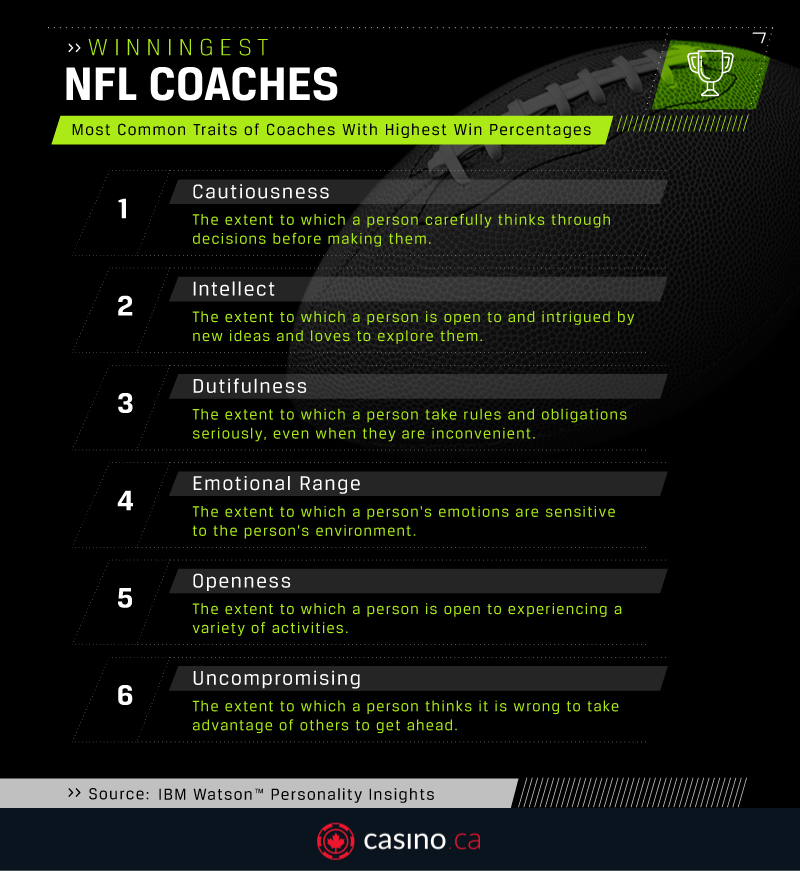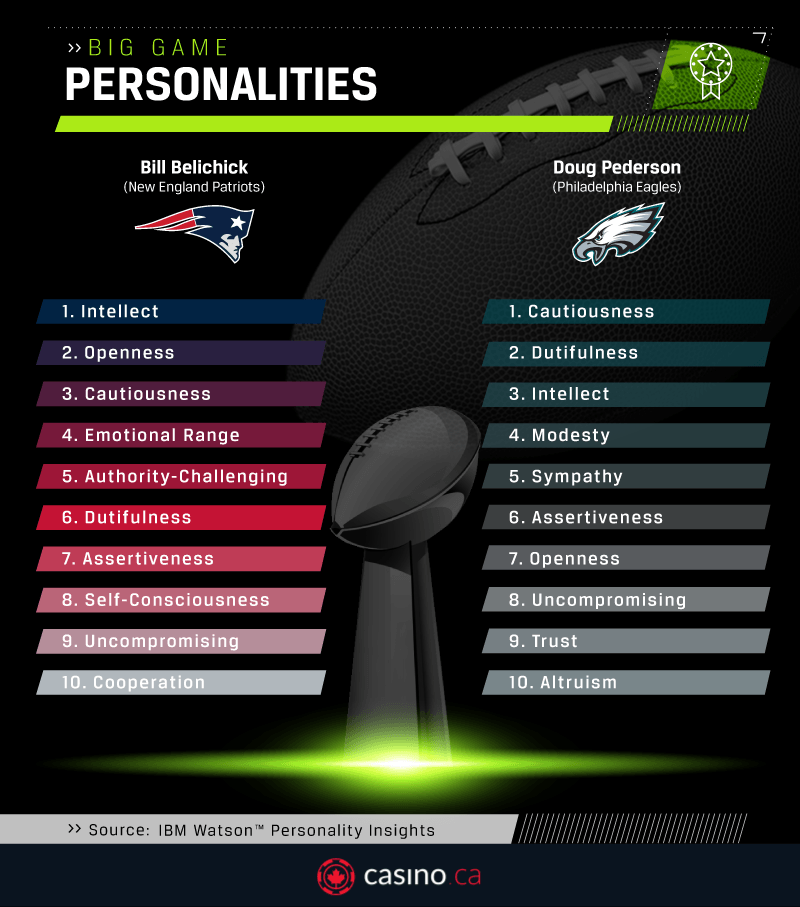The Secrets to Success

Using text transcripts from press conferences, interviews, and any social media posts on Twitter and Facebook, we used Watson’s personality analysis to determine the most common traits shared by the 10 NFL coaches with the highest win percentages.
More than just coordinating the right talent, planning and preparing for games, or motivating their players, some head coaches in the NFL even take the reins of
play-calling all for themselves. Given their vast array of responsibilities,
the most popular trait among successful head coaches was clear, according to Watson: cautiousness.
Gutsy play-calling may make
headlines for some coaches, but cautiousness, the tendency to think through all available possibilities
carefully before making a decision, is what really unites the league’s most successful coaches. Beyond their thoughtfulness, intellect, dutifulness, and emotional range all ranked as common traits shared by the winningest head coaches across the
NFL.
To do any job well, a person should at least have a fundamental knowledge of their craft. To reach the pinnacle of professional football coaching, most NFL coaches even
played the game in some capacity before picking up their headsets and ascending to the sideline throne. According to Watson, intellect makes a person
curious and leads to thinking in symbols and abstractions, in addition to being open and intrigued by new ideas rather than being set in old ways. For a sport so steeped in
tradition that some fans are willing to brave minus 14-degree temperatures as a point of pride, a little bit of innovation can go a long way on the road to success.
Triumphant Tendencies
So which coaches most embody the six traits that could be the secret sauce to a successful season or playoff berth?
Cautiousness might have been the No. 1 trait among successful coaches according to Watson, but cautiousness alone might not be the ticket to victory in the NFL. Anthony Lynn of the Los Angeles Chargers and Marvin Lewis of the Cincinnati Bengals each earned
the top spots for their cautious personalities. The 2017-18 season was Lynn’s first full year as head coach for the Chargers, who
finished the season at 9-7 and failed to earn a playoff berth. In contrast, Lewis has taken the Bengals to the playoffs seven times in his
15-year career as head coach, but has yet to win a single postseason game.
The three head coaches who earned the highest marks for intellect according to Watson – Mike Tomlin of the Pittsburgh Steelers, Sean McVay of the Los Angeles Rams, and Sean McDermott of the Buffalo Bills – all managed to make the playoffs following the
2017-18 season.
Of the 10 coaches identified for their intellectual personalities, seven made it to the postseason in 2018 – more than any other successful coach with a Watson-identified trait.
The range of
emotions NFL fans experience over the course of the season can go from the thrill of victory to the crushing blows of defeat on any given Sunday. Players have been known to share in these emotional
journeys, too, and Watson identified emotional range as one of the leading qualities among successful coaches. Also referred to as
neuroticism, emotional range describes a person’s ability to be sensitive and receptive to their environment. Anthony Lynn, Marvin Lewis, and John Harbaugh of the Baltimore Ravens all earned the highest ratings for their emotional range based on
Watson’s analysis.
GOAT Status?

Making it through the season and into the playoffs is one thing, but making it to the very end of the year as one of two teams left to be crowned the NFL’s reining champions is something else entirely. Leading up to the big game, we examined Watson’s
analysis of the last two coaches standing to understand what they might have in common and what undoubtedly sets them apart.
With just two years as a head coach under his belt, Pederson managed to go 13-3 with the Philadelphia Eagles. Having
served as offensive coordinator for the Kansas City Chiefs between 2013 and 2015, the 2017-18 season marks Pederson’s first trip to the playoffs in his title as head coach. Doug Pederson may be new to this level of attention, but Bill Belichick
certainly needs no introduction. Having served as head coach of the New England Patriots for 18 years and
counting, he’s seen just as many championship games as he has
controversy and critique. Still, that doesn’t keep some experts in the league from referring to Belichick as possibly being the greatest head coach of
all time .
So what makes these two coaches so special? Belichick and Pederson shared two of the top three personality traits according to Watson: intellect and cautiousness. For Belichick, intellect came out as the leading identifier, while Pederson’s analysis revealed
a proclivity for cautiousness.
In contrast,
while Pederson’s personality revealed a predilection for dutifulness (or having a strong sense of obligation), Belichick’s analysis revealed openness as his second-strongest trait. Not always known for having the warmest exchanges after games or
in interviews, openness
refers to the extent to which a person is open to new experiences or activities. It seems one of the main ways Belichick expresses openness is by winning (a lot), which allows him to excel in this trait.
Conclusion
When it comes to the NFL, success is never guaranteed. There’s always the chance for underdogs to prevail and
upsets to occur. Still, analysts are constantly trying to
define how successful teams got that way as a blueprint for teams that might follow in their footsteps. According to Watson’s analysis, the most successful coaches in the NFL certainly have a few things in common. Despite the level of depth it requires
to be successful in any professional sport, it might not be their tenacity on the sidelines or candor in the locker room that helps elevate some head coaches over their peers. Instead,
traits like cautiousness, intelligence, and openness ranked among the most common attributes shared by the most successful head coaches in the league. Perhaps with all the data in Watson’s “brain,” maybe someone will finally be able to contend with
the Patriots’ winning ways.
Methodology
For this project, we gathered transcripts from past press conferences, interviews, and social media posts from platforms like Facebook and Twitter produced by current coaches in the National Football League (NFL). The social scrape was performed on Jan.
19, 2018 at 5:02 p.m. After obtaining approximately 3,000 to 5,000 words per coach, we fed the text through IBM’s Watson™ Personality Insights API to infer personality traits on an individual level. To determine the top traits of a winning coach, we
examined career winning percentages of all current NFL coaches and identified the six most common traits among them.
IBM’s Watson™ Personality Insights provides detailed personality portraits by analyzing groups of written text. This linguistic analysis allows the software to predict individual personality characteristics from Needs and Values to Big Five personality
traits.
Sources
Fair Use Statement
Down, set, hike! Ready to pass along our breakdown of some of the most successful coaches in the NFL? You’re welcome to share the results of our study with your readers for any noncommercial purposes. Just ensure a link back to this page so our contributors
earn credit for their work too.
Interested in trying your luck? Check out our comparisons of the best online sports betting sites for Canadians, with the best bonuses and customer service anywhere.


